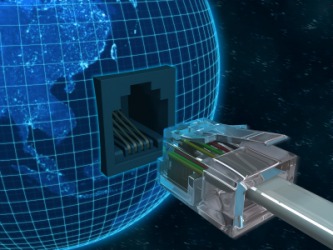people in the world are familiar with this word "internet" ,, but just some people knows about the means of internet, thats why i will share about definition of internet :D
A Closer Look: Definition of Internet
The Internet is a group of computer networks interconnected around the world. It is the largest communication network
ever conceived. The connected networks are comprised of educational,
commercial and government sites. The interconnected networks may be made
up of any number of computers from two to infinity. The collection of
sites residing on the Internet form one of the largest repositories of
information in history.
 The
Internet is an independent organism that relies on the voluntary
contributions of supporters. No one in particular owns the Internet or
the contributions. One of the main attributes of the Internet is there
is no central controlling computer or person that directs traffic or
information. The protocols and conventions used allow the system to
control the operations and tasks of all the millions of users. The
Internet began in 1973 as a project proposed by the United States
Department of Defense Advanced Research Projects Agency. The network was
designed to link research facilities at defense agencies and
universities within the United States. During the next 10 years, hard
work was put in to bring the networks around the world into
communication with each other. In 1983 the Internet as we know it was
released to the world. One of the applications that have been designed
for the use of the Internet is the World Wide Web. It was designed by
the European Center for Nuclear Research (CERN) in 1989. The Web, as it
is known today, allowed for information to be searched and viewed in
graphical mode. A search engine could search all available published
information to find anything and everything that was relevant to the
search parameters.
The
Internet is an independent organism that relies on the voluntary
contributions of supporters. No one in particular owns the Internet or
the contributions. One of the main attributes of the Internet is there
is no central controlling computer or person that directs traffic or
information. The protocols and conventions used allow the system to
control the operations and tasks of all the millions of users. The
Internet began in 1973 as a project proposed by the United States
Department of Defense Advanced Research Projects Agency. The network was
designed to link research facilities at defense agencies and
universities within the United States. During the next 10 years, hard
work was put in to bring the networks around the world into
communication with each other. In 1983 the Internet as we know it was
released to the world. One of the applications that have been designed
for the use of the Internet is the World Wide Web. It was designed by
the European Center for Nuclear Research (CERN) in 1989. The Web, as it
is known today, allowed for information to be searched and viewed in
graphical mode. A search engine could search all available published
information to find anything and everything that was relevant to the
search parameters.How It Works
The goal of the Internet is to inform, teach and entertain its users. By 1996, there were more than 25 million computers online in over 180 countries. This number continues to grow at an exponential rate each year. There is more information available now on the Internet than can be found in the largest library in the world.An IP address is a decimal number that defines the routing information of the user, but is hard to remember and interpret so IP addresses are translated into alphanumeric names called domain names. The named address includes the type of organization, the name of the supplier and oftentimes may indicate the particular resource being drawn from (e.g., www.microsoft.com or www.uwashington.edu). The named address can also indicate the country of origin, such as .ca for Canada or .uk for the United Kingdom.
Information Superhighway
The Internet is the largest step towards the Information Superhighway that has been made to date. Other advancements continue to be made almost daily both in hardware and software. Content is now available to the Internet community that was only available by other means in the past, such as television, print or radio. As technology continues to change and develop in the field of communications, computers and information management, the goal of reaching the Information Superhighway will progress. Commerce has already progressed to being much more of a global marketplace but there is still a ways to go before a true global marketplace can be attained. Once the Information Superhighway has been reached, the business world will certainly be more responsive and able to communicate amongst themselves and with the public in a proactive manner. As children are growing and being educated, the Internet has become a integral part of that process. It has become the default research tool for information and further education. Collaboration and remote learning opportunities are now available to schools and homes across the world. Current research projects in remote locations can broadcast there day to day progress and discoveries to viewers around the globe. The Internet has bought the World closer and made it smaller by increasing the ability to communicate with anyone, anywhere.credit: http://reference.yourdictionary.com/word-definitions/definition-of-internet.html
Tidak ada komentar:
Posting Komentar